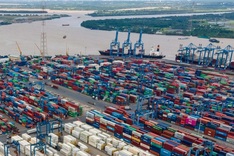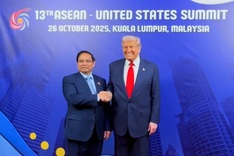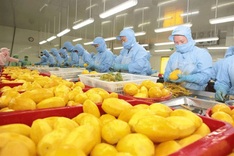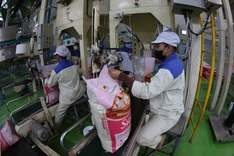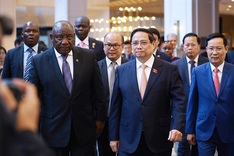Seven G20 countries face deep scrutiny over their fiscal and financial imbalances, French Finance Minister Christine Lagarde said Friday, announcing a new framework assessing global economic risks.
 |
| This handout photo provided by the International Monetary Fund (IMF) shows G20 Finance Ministers and Bank Governors meeting in Washington |
A Group of 20 delegation member told AFP the affected countries "included the G5" -- the United States, France, Britain, Japan and Germany -- and "two big emerging countries," suggesting China and India.
Lagarde would only confirm that France was one of the seven countries in which the G20 sees systemic risk, based on a newly agreed set of "mechanical" measures.
But she said they were "clearly large economies" that would now be subject to a "second step" of assessment that could end up prescribing policies set by their G20 brethren later this year.
The G20 meeting Friday was due to address imbalances in trade, capital flows, debt and foreign exchange that pose systemic risks to the global economy, and decide "indicative guidelines" for assessing unhealthy behavior.
"One of the challenges that we faced was all that is involved in a strong, durable and balanced growth," Lagarde said.
She said the guidelines were tougher for richer countries, and stressed they were not subjective but rather mechanically applied.
"It\'s not as if we decided out of nowhere," she said -- another indication of the depth of problems in the world\'s leading economies.
With the IMF\'s help, the seven will go under closer scrutiny and the results will go to the G20 heads of state at their summit in Cannes, France in November.
In a statement, the G20 also said it would more closely assess risky capital flows, unhealthy reserve accumulation, skewed exchange rates and other symptoms of artificial or troubling imbalances in the global economy.
"Our aim is to promote external sustainability and ensure that G20 members pursue the full range of policies required to reduce excessive imbalances and maintain current account imbalances at sustainable levels," it added.
The G20 also took note of sharply rising commodity prices, including food, and said they were awaiting the results of studies that could address excessive price volatility and how that affects food security.
According to the statement, the countries agreed on "the need for participants in commodity derivatives markets to be subject to appropriate regulation and supervision" and called for more transparency in cash and derivatives markets.
But the group noted that, despite soaring oil prices in the wake of the upheaval across the Middle East and North Africa, and after Japan\'s March 11 earthquake and tsunami disaster, there was no real shortage of energy supplies in the world.
"Events in some Middle East-North African countries and in Japan have increased economic uncertainty and tensions in energy prices," the world powers said.
Rising and volatile food and energy prices have been a key theme of the International Monetary Fund and World Bank annual spring meetings.









